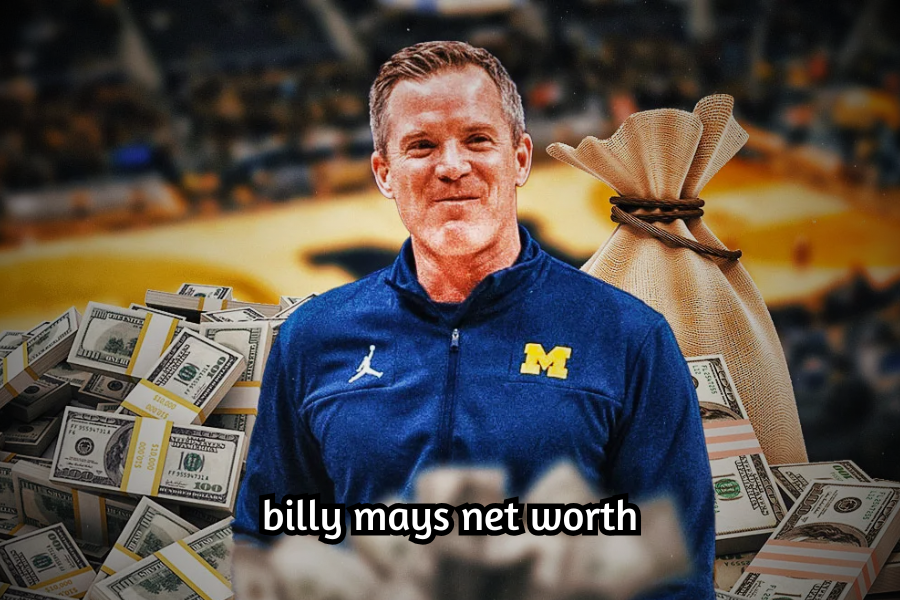Introduction
Billy Mays was one of the most well-known faces in American infomercial history, with a career that spanned decades and reached millions of homes. His booming voice, enthusiastic demeanor, and signature catchphrase, “Hi, Billy Mays here,” became synonymous with infomercial culture. Over time, he built a substantial fortune, with Billy Mays Net Worth at the time of his death being estimated at around $10 million. However, the true story behind Mays’ wealth and success is not as simple as it may seem. Let’s dive into the details of his life, career, and how he accumulated his wealth.
Early Life and Background
Billy Mays was born on July 20, 1958, in McKees Rocks, Pennsylvania, a suburb of Pittsburgh. His parents, Bill and Margaret Mays, had a significant impact on his early life. His father, a businessman, exposed him to the world of sales, while his mother helped instill in him a sense of discipline. Mays was a natural performer and was known for his charisma from a young age. After graduating from high school, he attended the University of West Florida but didn’t complete a college degree.
Mays started his career in the 1980s, working as a door-to-door salesman and for a variety of sales companies. His early experience helped him hone his public speaking and persuasive skills, which would later make him an iconic figure in the infomercial world. Initially, he sold products like home improvement tools at local fairs, but he truly found his calling in the world of direct response television (DRTV).
Breakthrough with OxiClean
Billy Mays’ breakthrough came in the early 1990s when he was hired by Orange Glo International, a company that specialized in cleaning products. He was tasked with promoting their flagship product, OxiClean. At the time, OxiClean was an unproven product, but Mays’ vibrant and compelling salesmanship turned it into a household name. His ability to convey the effectiveness of the product in a way that was both entertaining and persuasive played a huge role in OxiClean’s success.
Mays’ larger-than-life persona helped sell OxiClean in a way that no other spokesperson could. His enthusiastic pitch about the product’s ability to “clean anything” made him a staple on late-night TV, and soon, OxiClean became one of the top-selling cleaning products in America. Mays’ success with OxiClean made him an icon of infomercial advertising and led to numerous other product endorsements.
You Might Also Like: Eric Mays Net Worth: A Deep Dive into the Life of a Controversial Flint Politician
Expanding His Reach: Mighty Putty, Zorbees, and More
While OxiClean was Mays’ biggest success, he wasn’t limited to just one product. Over the years, he lent his voice and face to a wide array of products. One of his most notable endorsements was for Mighty Putty, a powerful adhesive used to fix cracks and holes in various surfaces. The product’s effectiveness, combined with Mays’ energetic pitch, made it another success.
Mays also worked with products like Zorbees, a super absorbent towel, and the Big City Slider Station, a device for making mini burgers. Though not every product he pitched was a winner, Mays knew how to market them in a way that generated buzz. His pitch style was straightforward yet entertaining, making even the most mundane products seem indispensable.
By the mid-2000s, Mays had established himself as the face of direct response advertising. His commercial empire expanded beyond just household cleaning products, as he began promoting items like food-related gadgets, car accessories, and home improvement tools. His success wasn’t limited to his on-screen persona; he was also an astute businessman, using his fame to negotiate lucrative contracts and deals with major corporations.
The Business of Billy Mays
Billy Mays’ income came not just from his television appearances but also from his business ventures. As his fame grew, he established Billy Mays Productions, a company through which he created and produced infomercials for various products. Through this company, he had the ability to produce, direct, and market his own commercials, which gave him greater control over his income and brand. Mays was known for being highly involved in the creation of his ads, ensuring that each product was presented in a way that would maximize sales.
His income from these projects was substantial. Mays was reportedly paid between $20,000 and $30,000 for each commercial appearance, but his true earnings came from the deals he negotiated. Often, he received a cut of the gross sales generated by the products he promoted, a system that made him incredibly wealthy. The success of OxiClean alone helped Mays earn millions over the years, and as his brand grew, so did his net worth.
Beyond Infomercials: Mays’ Ventures into Pop Culture
Billy Mays wasn’t just an infomercial pitchman; he also made his mark on pop culture. In 2009, he starred in the Discovery Channel reality show PitchMen, which followed Mays and fellow pitchman Anthony Sullivan as they evaluated new products and worked with inventors to bring their ideas to the market. The show was a success, further solidifying Mays’ place in the public eye.
In addition to PitchMen, Mays appeared in several commercials and TV spots for various companies. He even appeared in a comedic sketch on The Tonight Show with Jay Leno, poking fun at his signature style of over-the-top salesmanship. Mays was a good sport about the parody, showing that he didn’t take himself too seriously.
His influence also extended to viral internet videos. Mays became a target for many online parodies, including the infamous “Billy Mays vs. Vince Offer” meme. Vince Offer, the pitchman for ShamWow, was one of the few people to rival Mays in terms of recognition in the infomercial world. The two were even involved in a brief public feud, with Mays challenging Offer to a “pitch-off” to determine the superior salesman. While nothing came of the challenge, it demonstrated Mays’ competitive spirit and commitment to his craft.
You Might Also Like: Too Turnt Tony Net Worth: A Deep Dive into the Life and Success of a Social Media Star
Billy Mays’ Legacy and Net Worth at the Time of His Death
At the time of his death in June 2009, Billy Mays had an estimated net worth of $10 million. While he was not a billionaire, he was certainly among the wealthiest infomercial stars of his era. His wealth stemmed not only from his TV appearances but also from his ability to negotiate lucrative contracts and create his own infomercial production company. His contributions to the advertising world were immense, and his larger-than-life personality made him a beloved figure in pop culture.
Mays passed away unexpectedly at the age of 50, due to heart disease, leaving behind a legacy that continues to resonate with fans and marketers alike. His influence can still be seen in modern infomercials, where his style of high-energy promotion is still emulated by others in the industry.
The Lasting Impact of Billy Mays on Infomercial Culture
Billy Mays’ impact on infomercial culture is undeniable. His ability to create excitement around even the most mundane products revolutionized the direct response marketing industry. His high-energy pitches and charisma set the standard for how products should be marketed to consumers. While the industry has changed since Mays’ heyday, his influence remains.
Mays’ legacy continues to live on through the products he pitched and the marketers who emulate his style. His larger-than-life persona and memorable commercials left a lasting impression on both the world of advertising and the entertainment industry. Today, his name is still associated with the golden age of infomercials, and his wealth is a testament to his success as a pitchman and entrepreneur.
Billy Mays may have passed away too soon, but his contributions to television, advertising, and pop culture will not be forgotten. His net worth, while impressive, is only a small part of his legacy. He was, and still is, the king of infomercials, a title he earned through hard work, charisma, and a passion for sales.
You Might Also Like: Marquett Davon Burton Net Worth: A Deep Dive into His Entrepreneurial Journey and Wealth
Conclusion
Billy Mays’ remarkable career in infomercial advertising not only made him a household name but also enabled him to amass a significant fortune. With an estimated net worth of $10 million at the time of his passing, Mays exemplified the power of charisma, salesmanship, and the ability to negotiate lucrative deals. His impact on the world of infomercials and direct response marketing was profound, and his larger-than-life persona continues to influence the industry today. Though his life was tragically cut short, Billy Mays’ legacy as a pioneering pitchman lives on, both in the products he promoted and the marketing strategies he helped shape.
FAQs
What was Billy Mays net worth at the time of his death?
Billy Mays net worth at the time of his death in 2009 was estimated at around $10 million, built from his successful infomercial career and his business ventures.
How did Billy Mays become famous?
Billy Mays gained fame through his role as a pitchman for products like OxiClean. His energetic sales style, along with his signature catchphrase, “Hi, Billy Mays here,” helped him become an iconic figure in infomercial advertising.
What other products did Billy Mays promote?
In addition to OxiClean, Billy Mays promoted a variety of products, including Mighty Putty, Zorbees, and the Big City Slider Station, among others. His enthusiastic pitches helped make these products household names.
Did Billy Mays have his own production company?
Yes, Billy Mays founded Billy Mays Productions, a company that allowed him to create, produce, and market his own infomercials, giving him greater control over his income and brand.
What was Billy Mays’ impact on pop culture?
Billy Mays became a pop culture icon, appearing in viral internet videos, parody sketches, and even starring in a Discovery Channel reality show, PitchMen. His influence extended beyond infomercials into mainstream entertainment.
What happened to Billy Mays?
Billy Mays passed away on June 28, 2009, at the age of 50 due to heart disease. His unexpected death was a loss to the advertising world, but his legacy as the king of infomercials endures.
Explore the latest news and updates on Times Bullion THANK YOU!

